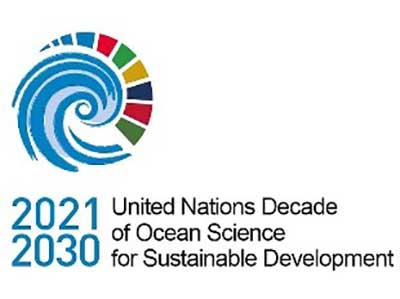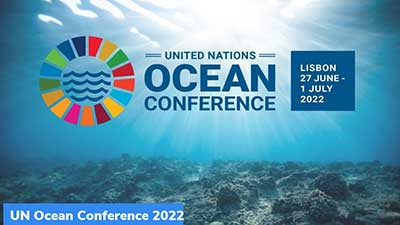Relevance: GS-2: Important International institutions, agencies and fora- their structure, mandate.
Relevance: GS-3: Conservation, environmental pollution and degradation.
Key Phrases: United Nations, UN Ocean Conference 2022, Ocean conservation, Lungs of the planet, Biodiversity, Diseases and pandemics, Blue Economy Policy, India’s Indo-Pacific Oceans Initiative, India- Norway Ocean Dialogue, Sustainable Development Goal 14.
Why in News?
- The United Nations is holding a conference it hopes will bring fresh momentum to efforts for an international agreement on protecting the world’s oceans.
U.N. Ocean Conference 2022:
- UN Ocean Conference 2022 is being held for five days with participation of over 130 countries from across the world in Lisbon, Portugal.
- The conference is set to adopt a declaration that, though not binding on its signatories, could help implement and facilitate the protection and conservation of oceans and their resources.
- It is a momentum to protracted efforts for a global agreement on protecting the world’s oceans.
- The conference is an important opportunity to accelerate steps toward a high seas treaty.
- The conference is also expected to reaffirm and build upon some 62 commitments made by governments at the previous summit in Nairobi, Kenya in 2018, from protecting small island states with ocean-based economies to sustainable fishing and combatting warming waters.
- Financing models for ocean conservation are also on the agenda this year, as well as coming up with science-based, innovative solutions that might improve ocean health.
United Nations Ocean Conference 2017
- The United Nations Ocean Conference was held for the first time in June 2017 in New York.
- It sought to mobilize action for the conservation and sustainable use of the oceans, seas and marine resources.
- The Governments of Fiji and Sweden had the co-hosting responsibilities of the Conference.
Why ocean conservation is important?
- The ocean covers 70 percent of the Earth’s surface, is the planet's largest biosphere, and is home to up to 80 percent of all life in the world.
- It generates 50 percent of the oxygen we need, absorbs 25 percent of all carbon dioxide emissions and captures 90 percent of the additional heat generated from those emissions.
- It is not just ‘the lungs of the planet’ but also its largest carbon sink - a vital buffer against the impacts of climate change.
- It nurtures unimaginable biodiversity and produces food, jobs, mineral and energy resources needed for life on the planet to survive and thrive.
- Ocean is facing unprecedented threats as a result of human activities. Its health and ability to sustain life will only get worse as the world population grows and human activities increase.
- To address some of the most defining issues of our time such as climate change, food insecurity, diseases and pandemics, diminishing biodiversity, economic inequality and even conflicts and strife.
India's initiative towards ocean conservation:
Blue Economy Policy:
- The Ministry of Earth Sciences (MoES) rolled out the Blue Economy policy for India.
- The blue economy policy document outlines the vision and strategy that the Government of India can adopt to utilise the plethora of oceanic resources available in the country.
- The draft policy framework emphasises policies across several key
sectors to achieve holistic growth of India’s economy. The document
recognises the following seven thematic areas:
- National accounting framework for the blue economy and ocean governance
- Coastal marine spatial planning and tourism
- Marine fisheries, aquaculture, and fish processing
- Manufacturing, emerging industries, trade, technology, services, and skill development
- Logistics, infrastructure and shipping, including trans-shipments
- Coastal and deep sea mining and offshore energy
- Security, strategic dimensions, and international engagement
India’s Indo-Pacific Oceans Initiative (IPOI)
- It is an open, non-treaty based initiative for countries to work
together for cooperative and collaborative solutions to common challenges
in the region. IPOI draws on existing regional architecture and
mechanisms to focus on seven pillars:.
- Maritime Security
- Maritime Ecology
- Maritime Resources
- Capacity Building and Resource Sharing
- Disaster Risk Reduction and Management
- Science, Technology and Academic Cooperation
- Trade Connectivity and Maritime Transport
India- Norway Ocean Dialogue:
- In 2019, the Indian and Norwegian governments agreed to work more closely on oceans by signing a MoU and establishing the India-Norway Ocean Dialogue
Initiatives for Conserving Marine Resources
Government of India has already undertaken several initiatives focusing on the conservation of coastal and marine resources. Few examples are:
- The Wild Life Protection Act of India (1972) provides legal protection to many marine animals. There are total of 31 major Marine Protected Areas in India covering coastal areas that have been notified under Wildlife Protection Act, 1972.
- The National Committee on mangroves, wetlands and coral reefs constituted in 1993 advises Government on relevant policies and programmes regarding marine species.
- The Coastal Regulation Zone (CRZ) notification (1991 and later versions) prohibi developmental activities and disposal of wastes in the fragile coastal ecosystems.
- The Biological Diversity Act of India,2002 and the Biological Diversity Rules 2004, and the guidelines thereof advise the Government on matters related to the protection and conservation of biodiversity, sustainable use and equitable sharing of its components, Intellectual Property Rights, etc.
- The Department of Fisheries, Govt. of India is implementing a
flagship scheme namely the PradhanMantriMatsyaSampadaYojana (PMMSY)
for sustainable and responsible development of fisheries sector in
India. Two of the key objectives of the scheme are
- Harnessing of fisheries potential in a sustainable, responsible, inclusive and equitable manner
- Robust fisheries management and regulatory framework.
- The Centre for Marine Living Resources and Ecology (CMLRE), an attached office of Ministry of Earth Sciences (MoES) is mandated with the management strategies development for marine living resources through ecosystem monitoring and modelling activities. Based on 24 years of survey studies, it has generated an extensive knowledge base on the biodiversity aspects within India’s Exclusive Economic Zone including hotspots for conservation.
Do you know?

Sustainable Development Goal 14: Life Below Water
- Adopted in 2015 as an integral aspect of the 2030 Agenda for Sustainable Development goals, Goal 14 stresses the need to conserve and sustainably use the world’s oceans, seas and marine resources.
- Advancement of Goal 14 is guided by specific targets that focus on
an array of ocean issues, including
- reducing marine pollution
- protecting marine and coastal ecosystems
- minimizing acidification
- ending illegal and over-fishing
- increasing investment in scientific knowledge and marine technology
- respecting international law that calls for the safe and sustainable use of the ocean and its resources.

UN Decade of Ocean Science for Sustainable Development 2021 – 2030
- A vast majority of the ocean remains unmapped, unobserved and unexplored. Our understanding of the ocean and its contribution to sustainability largely depends on our capacity to conduct effective ocean science -through research and sustained observations, supported by adequate infrastructures and investments.
- The Decade provides a common framework to ensure that ocean science can fully support countries’ actions to sustainably manage the ocean and more particularly to achieve the 2030 Agenda for Sustainable Development – through the creation of a new foundation, across the science-policy interface, to strengthen the management of the ocean and coasts for the benefit of humanity.
Source: The Hindu
Mains Question:
Q. “Conservation and sustainable use the oceans, seas and marine resources are must for sustainable development”. Discuss.







